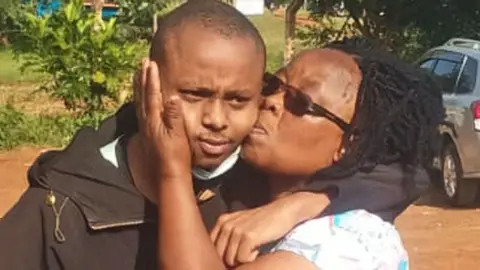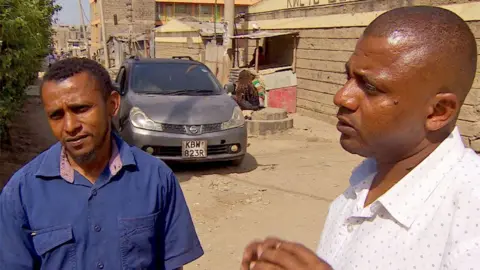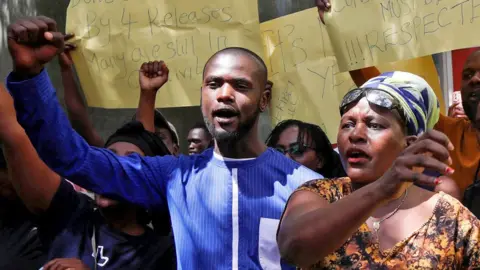BBC News, Nairobi
 Gerald Carisha
Gerald CarishaThe disappearance of more than 80 government critics during the past six months sparked huge popular reactions in Kenya.
One of the judges has warned that senior security officials will be imprisoned for the court’s contempt on Monday if they failed to appear for the third time to explain the last alleged kidnapping series.
This issue is linked to the disappearance cases documented by the Kenyan National Human Rights Committee since the protests began at the country level against the proposed tax increases last June.
It is said that at least 24 people are still missing.
Police and the government denies the kidnapping and detention of the demonstrators illegally, but the country has a history of the state sponsored, and some Kenyans are afraid of returning to that dark past.
The Inspector General of Police, Douglas Kanga and the director of the Criminal Investigation Directorate, Mohamed Amin, ordered the present seven social media influencers who disappeared in December to the court.
Five of them suddenly appeared in early January in different locations throughout the country.
Kanja’s lawyers asked the court more time to register their statements and submit a report.
Billy Mwanji is one of the five. The 24 -year -old was removed by his alleged kidnappers, 75 km (46 miles) from his hometown in Embo, central Kenya, in a clear intimidation.
Billy’s father, Gerald Mawanji Carisha, told BBC that his son was shocked.
“The boy did not participate much,” he said. “All I can say is that when he came, he was not of his nature.
Billy, a university student who was one of the most severe critics of the government on social media. He disappeared on December 21, 2024 while he was in a barber shop in Imbo.
According to eyewitnesses, masked men arrived in the Toyota Velder and a double cabinet, put it in one of the vehicles and drove off.
Within hours, the worst concerns of his family began to reveal.
“On most weekends, we watch football together. His club is Chelsea and Arsenal,” said Gerald.
He called Billy to discuss a football match on the evening of his disappearance, to find his son’s phone closed.
The owner of the barber shop later informed him of the kidnapping, which led to a feverish research.
Billy’s mother collapsed when I heard the news and the weeks that followed the family were painful.
Once he was found, Pelly was taken to the hospital for a routine examination. His family says he is still recovering from shock, but his release brought them a degree of rest.
Like many who returned to appear after alleged kidnappings, Billy did not say much about his ordeal, perhaps because of fear.

Jamil and Aslamalong also committed silence after their release in September after they spent 32 days in captivity.
Jamil says that the two brothers have been warned that they would be killed if they went to the media.
Three months later, a government official publicly indicated their case as legal detention.
This siblings were considered as an affirmation that a government agency was responsible for what they went through and found the courage to speak publicly.
“The Kenya constitution is very clear,” says Jamil. “You must be arrested and brought to the court within 24 hours. We had 32 days. We were not granted a lawyer to represent us anywhere.
“We were not allowed to see our family or communicate with our family. So this is not an arrest, but a kidnapping.”
The two brothers told the BBC that Aslam helped organize protests against the high taxes in the town of Ketenega near the capital, Nairobi, and the security men warned him against stopping his activity.
On one day of August, they were taken to a car near their house, with their heads and handcuffed, and they were taken to an unknown location where they were detained in small dark cells.
Aslam says he was beaten regularly, and his tormentor was calling for the knowledge of the protests.
“I was very afraid,” he says. “When the door was opened, that man came with a wire of fiber and a metal penis.
“I was afraid that he came to strike me or eliminate me, and there was only two options to strike me or kill me.”
Jamil describes their kidnappers as armed with weapons, are able to track their mobile phones, and are confident enough to capture them in broad daylight, and they work at a level of resources and the degree of flexibility that human rights groups have reported in many cases.
But this does not mean that they are official security agents, government spokesman, Isaac Murora, says, denying that the state is behind the kidnappings.
“Organized security may also be part of the organized crime,” he told the BBC.
“This may also be for political reasons … Our political critics have really criticized this issue. They are actually dealing with it only to liquidate political accounts.”
Mr. Moora refused to comment on the matter The case of the Minister of Government, Justin MotoriOne of the most accused regulations is condemned by the Kenyan security services.
Motori says that the National Intelligence Service arrested his son and was not released until after he made a direct appeal to President William Roto.
“This is a matter of under investigation, because this is his side of the story,” said Moora. “But what is the anti -national intelligence story?
“I would categorically say that the President of the Republic of Kenya, the prime minister, did not authorize any form of kidnapping at all, because he is a man who believes in the rule of law.”
The truth is that Roto publicly promised to stop the kidnappings, and had to respond to popular anger, and to the concerns shown by the Western allies.
Many feel sorrow because the systematic disappearance apparently for anti -government activists has returned to appearing in this way, which reminds us of similar methods under the authoritarian leadership of Daniel Arab Moy in the 1980s and 1990s.
 Reuters
ReutersGetopo Emanara, a journalist and activist who carried a campaign for partisan pluralism in the early 1990s, was arrested and hit by the MO regime. He has no doubt that he sees “Moi’s play rules” now.
But he says time has changed. Constitutional amendments have created more accountability mechanisms and “there is a larger segment of Kenyan society that will not be intimidated.”
“The democratic space has greatly expanded that the government cannot get rid of the opposition democratic votes,” he told the BBC.
He added that with social media, “the word is almost immediately spread.”
“We cannot undergo control in the way we are used to undergoing control in those days when we could only use the Earth’s lines.”
Reports have diminished about the disappearances in recent weeks.
However, despite the announcement of the police investigations, no accusations were charged, not to mention his condemnation of their implementation.
Several advocacy groups have submitted a petition to the Prosecutor calling for the referral of kidnapping cases to the International Criminal Court.
As for the families of the missing, the nightmare continues.
“We are very depressed and destroyed,” says Story Motoa, sister of Steve Mbisi, one of the seven who disappeared in December.
“We hope they will release him. [Most] One of the kidnappers was released, but it is still missing. We pray to be found. “
You may also be interested in:
 Getty Emiguz / BBC
Getty Emiguz / BBChttps://ichef.bbci.co.uk/news/1024/branded_news/f805/live/b3ac4fe0-d99a-11ef-902e-cf9b84dc1357.jpg

